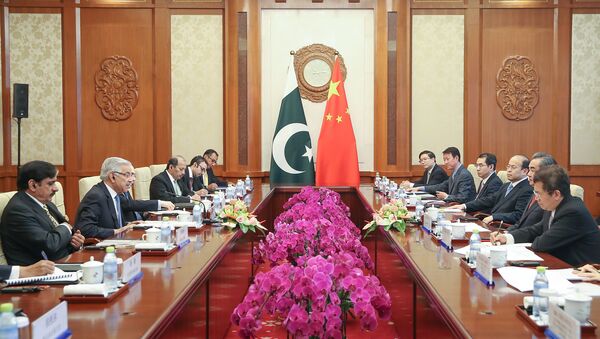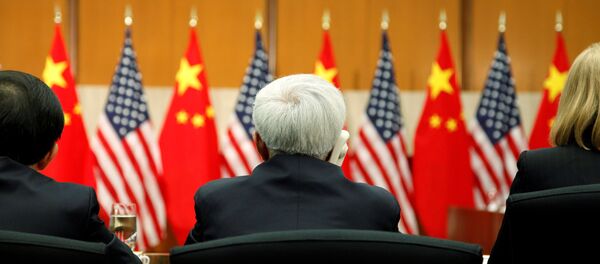Financial assistance to Islamabad was discussed during the visit of the Prime Minister of Pakistan Imran Khan to the United Arab Emirates over the weekend.
A Pakistani official quoted by the South China Morning Post said that negotiations with China on key projects and financial packages continue. The amount of money Pakistan is going to receive from China will be disclosed after all the details are finalised, he noted.
We can talk about a package of financial assistance from China totalling four billion, presumed Natalia Zamaraeva, a distinguished specialist on Pakistan at the Institute of Oriental Studies of the Russian Academy of Sciences.
"Four billion USD is good money for both parties. In part, this could be interest-free loans, traditional forms of financing by China, as well as interest-bearing loans. This sum is important to consider in conjunction with the 6.2 billion dollars that provide the UAE, as well as the help of Saudi Arabia and Qatar. Approximately $4 billion from China and eight billion, in the aggregate, from the Gulf countries is the amount Pakistan needs today to overcome the economic crisis, as well as to get free of IMF influence".
The IMF put forward "indentured" conditions for Pakistan, Natalia Zamaraeva said. This, in particular, is the mandatory disclosure of information on all financial accounts, strict targeted restrictions on the use of money, and the terms for project lending, the expert explained.
"In particular, the United States insists that IMF loans are not used to repay debts to China. Therefore, financial assistance from China and the Gulf countries is also an opportunity to get out of the IMF control and accordingly Washington. This is the political side of a possible deal between Islamabad and the IMF" the expert noted.
READ MORE: Analyst Explains How China Can Help Afghanistan, Pakistan Reconcile
China can provide investments of 4 billion dollars, not only for the sake of immediate or local interests but even more — in order for Pakistan to achieve national prosperity and development, and ensure stability and security. This will make the process of its development lengthier.
Ji Kaiyun, director at the Centre for Iranian Studies at the Chinese Southwest University, stated in an interview with Sputnik that "China's assistance to Pakistan should certainly pass an expert rationale and discussion over the course of multiple contacts," stressing further that the amount of funding was small. However, he called it a "very rational financial help."
"This assistance is not a donation. It is most likely a low-interest loan or interest-free loan. It will help strengthen the financial potential of Pakistan, at least to prevent a financial collapse or crisis, and it will also benefit the Pakistani economy and restore the functioning of its "blood flows," the expert stated.
READ MORE: Pakistan Gets 2nd $1Bln Saudi Deposit Amid Balance-Of-Payments Crisis — Bank
He went on to note that China and Pakistan were "all-weather strategic partners" adding that China's financial assistance to Pakistan is "also an important part of the multi-level relationship between them."
"As for whether these funds can make Pakistan more dependent on China, I do not think that this is the case. I believe that the spirit of the Silk Road is always win-win cooperation; this is a joint discussion and joint construction," he explained.
On the eve of talks with the IMF, Pakistani Prime Minister Imran Khan met with the Crown Prince of Abu Dhabi, Sheikh Mohammed bin Zayed on Sunday 6 January. It became their third meeting after Imran Khan came to power in August last year. Following the talks, anonymous sources reported that Pakistan will receive the promised $ 6.2 billion. In particular, 3.2 billion dollars are allocated for the purchase of oil with deferred payment.
For his part, Abid Al Ghafoor, a representative of the UAE Embassy in Islamabad, noted that Abu Dhabi will create an investment fund for sectors such as oil, tourism, and agriculture in Pakistan.
For the first time, financial assistance to Pakistan from the Gulf countries is being channeled into hydrocarbon projects. As a result, China's proposal to include the countries of the Persian Gulf in the Silk Road initiative may begin to be implemented.
The offer was made in 2016-2017. According to the expert, this includes, in particular, the construction of oil storage facilities at Gwadar Port, the infrastructure associated with the reception and transit of hydrocarbons, the construction and modernization of the runway at Gwadar airport, flyovers, access roads, and motorways.
The views and opinions expressed by the speaker do not necessarily reflect those of Sputnik.



